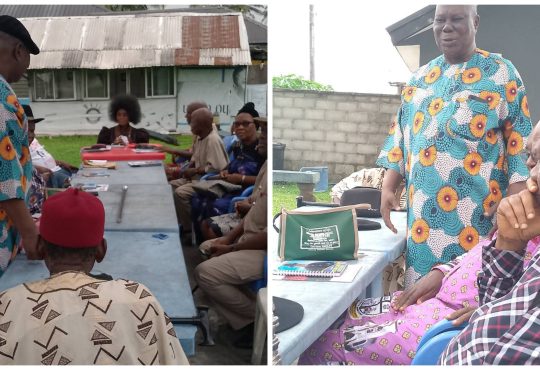The investment of Northern Nigeria in Niger Delta oil and gas, and other foolish sacrifices for one Nigeria.

By Sanusi Jimoh
For over half a century, our Northern political elite have failed to develop Arewa, focusing more on their personal and selfish interests in Southern Nigeria because they want Niger Delta crude oil money. Now Arewa is on fire, insecurity has escalated, poverty, hunger and unemployment are now at all time high. When you read in the papers with evidence around you that Nigeria is the poverty capital of the world, note that it is not actually the whole of Nigeria that is the poverty capital of the world. It is Arewa. The world bank says that 80% of the poverty in Nigeria is in the North. And the bulk of insecurity in Nigeria is also in the North. Hundreds of thousands of Northerners have been displaced and now scattered all over Nigeria from North to South as IDPs, barely managing to survive. There are also spill over of IDP camps with our Northern brothers and sisters in neighboring nations. Yet, the focus is still on Southern Nigeria and how to keep Nigeria one by all means, because of Niger Delta crude oil money.
But the problem is that this crude oil money does not benefit the majority of our people. It only benefits the few who are in Government. And we have suffered too much insults, and lost the opportunity to develop our own resources because of this. They call us economic parasites and so on. It does not make sense for us to continue like this. We have suddenly forgotten that our true potential has more benefits for our people than that Niger Delta crude oil money that our leaders have focused on, and for which reason they have not had the time or focus to prioritize the solid mineral industry (which includes gold) in the north, the agricultural potentials in crop farming and livestock farming.
Who will remind our Northern Political leaders that a gallon of groundnut oil is priced higher than a gallon of crude oil, a gallon of milk from cows is priced higher than a gallon of crude oil? Who will remind them? And more so, these vastly untapped potential and resources in Northern Nigeria will affect and enrich the citizens in Northern Nigeria directly, unlike the crude oil industry that enriches foreign multinationals first before even the Federal Government.
It is no longer wise to continue to leave Arewa undeveloped and insecure in this endless lust for Niger Delta crude oil money which has not done us any good in the North. The fundamental question is, would we not have had a more prosperous and more secure Northern Nigeria today if most of our investments were in our solid minerals industry here or if we had continued with our agricultural prowess and moved from having groundnut pyramids to having rice pyramids and modern cattle ranches? Would there have been banditry and Boko Haram or would it have been easy for them to recruit our people as fighters if the local governments were functional and there was no absence of Government at the grassroots?
Some of our political leaders are even saying that they are ready for another war in Nigeria against groups in the South that are asking for secession or restructuring back to regional government. They say that the North invested in Niger Delta crude oil industry and so they are ready to fight for it. Whereas it is direct foreign investment by companies like Shell that developed the oil industry, not Arewa.
They tell these lies to deceive our people and gather our support for this their selfish interests, and for their own lust. We must let them know that “enough is enough. We the ordinary people in Arewa do not benefit from the Niger Delta crude oil money. Let them go if they want to go. Or give them restructuring back to regional Government if that is what they want and let us focus on developing our resources.”
Here is excerpt from Wikipedia on the history of oil exploration in Nigeria to debunk the lies that we must go to war with southern secessionist groups because we purportedly invested in the Niger Delta oil industry:
The history of oil exploration in Nigeria started back in1903 when Nigerian Bitumen Corporation conducted exploratory work in the country; at the onset of World War I the firm’s operations were stopped. Due to the lack of technological and financial resources of small oil companies, large oil companies took over the exploration of commercial oil in the country. Thereafter, licenses were given to D’Arcy Exploration Company and Whitehall Petroleum but neither company found oil of commercial value and they returned their licenses in 1923. A new license covering 920,000 square kilometres (357,000 square miles) was given to Shell D’arcy Petroleum Development Company of Nigeria, a consortium of Shell and British Petroleum (then known as Anglo-Iranian). The company began exploratory work in 1937.
The association was granted license to explore oil all over the territory of Nigeria but the acreage allotted to the company in the original license was reduced in 1951 and then between 1955 and 1957. Drilling activities started in 1951 with the first test well drilled in Owerri area. Oil was discovered in non-commercial quantities at Akata, near Eket in 1953. Prior to the Akata find, the company had spent around £6 million on exploratory activities in the country. In the pursuit of commercially available petroleum, Shell-BP found oil in Oloibiri, Nigeria, in 1956. Other important oil wells discovered during the period were Afam and Bomu in Ogoni territory. Production of crude oil began in 1957, and in 1960 a total of 847,000 tonnes of crude oil was exported. Towards the end of the 1950s, non-British firms were granted license to explore for oil: Mobil in 1955, Tenneco in 1960, Gulf Oil and later Chevron in 1961, Agip in 1962, and Elf in 1962. Prior to the discovery of oil, Nigeria (like many other African countries) strongly relied on agricultural exports to other countries to supply their economy. Many Nigerians thought the developers were looking for palm oil.But after nearly 50 years searching for oil in the country, Shell-BP discovered oil at Oloibiri in the Niger Delta. The first oil field began production in 1958.
And from the website of NNPC, here is the history of the oil and gas industry in Nigeria. It is purely foreign investors affair, not Arewa money as these our selfish Northern Political leaders claim just so that they can justify why they focus more on the South than on our own development. Whereas they are only looking after their individual pocket:
Oil was discovered in Nigeria in 1956 at Oloibiri in the Niger Delta after half a century of exploration. The discovery was made by Shell-BP, at the time the sole concessionaire. Nigeria joined the ranks of oil producers in 1958 when its first oil field came on stream producing 5,100 bpd. After 1960, exploration rights in onshore and offshore areas adjoining the Niger Delta were extended to other foreign companies. In 1965 the EA field was discovered by Shell in shallow water southeast of Warri.
In 1970, the end of the Biafran war coincided with the rise in the world oil price, and Nigeria was able to reap instant riches from its oil production. Nigeria joined the Organisation of Petroleum Exporting Countries (OPEC) in 1971 and established the Nigerian National Petroleum Company (NNPC) in 1977, a state owned and controlled company which is a major player in both the upstream and downstream sectors.
Following the discovery of crude oil by Shell D’Arcy Petroleum, pioneer production began in 1958 from the company’s oil field in Oloibiri in the Eastern Niger Delta. By the late sixties and early seventies, Nigeria had attained a production level of over 2 million barrels of crude oil a day. Although production figures dropped in the eighties due to economic slump, 2004 saw a total rejuvenation of oil production to a record level of 2.5 million barrels per day. Current development strategies are aimed at increasing production to 4million barrels per day by the year 2010.
Petroleum production and export play a dominant role in Nigeria’s economy and account for about 90% of her gross earnings. This dominant role has pushed agriculture, the traditional mainstay of the economy, from the early fifties and sixties, to the background.
Sanusi Jimoh is passionate about a progressive and prosperous Northern Nigeria where the Interest of the ordinary people comes first before the Interest of career politicians. He can be reached on sanusi.jimoh@yahoo.com .



